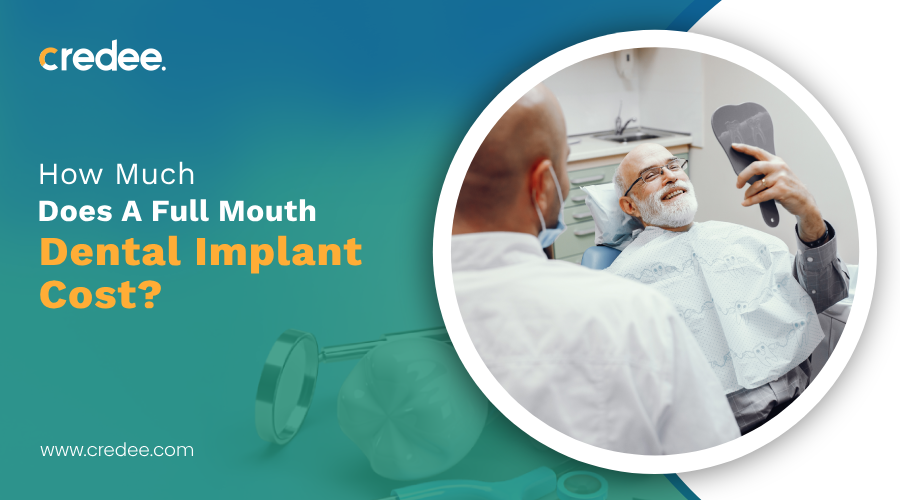
According to the American College of Prosthodontists, 120 million Americans are missing at least one tooth.
And a gap in the teeth can keep one from smiling ear to ear. That was until dental bridges were as common. Now, bridging the gap between teeth isn’t a far-reaching thought.
However, there is one question that perplexes people and makes them second-guess the procedure- “How much does a dental bridge cost without insurance?” If you’re one of them, read on! Our blog covers everything you need to know about the dental bridge cost without insurance. That’s not all; discover numerous ways to afford dental bridges, including dental patient financing, and dental payment plans through Credee.
But First, What Are Dental Bridges?
True to its name, a dental bridge does just that - bridge the gap created by a missing tooth. The procedure involves fitting natural teeth on either side of the gap with crowns to rectify the gap. These supporting teeth are referred to as abutment teeth. Once an abutment tooth is intact, a dentist places a pontic (false tooth) into the gap and cements it to the neighboring teeth on each side.
Dental Bridges Primarily Have 3 Purposes:
(a) Replace Missing Teeth
(b) Restore chewing function
(c) Improve smile aesthetics
To elaborate on that, while the immediate concern for many regarding tooth loss is its impact on one's appearance, it is imperative to note that its consequences extend beyond just that. A missing tooth can disrupt the alignment of the surrounding teeth, leading to jaw instability, and pain.
That's not it, it can also alter the shape of your face, promote gum disease, and create difficulties in chewing and speaking. And that is why the dental bridge is more of a need than a mere choice for many. Moving on, let’s understand how much a dental bridge costs without insurance.
Discover how you can revitalize your smile without breaking the bank! Check out financing options for dental implants today.
How Much Is A Bridge For Teeth?
To be succinct, bridges can range in price from $1,500 to $6,000 per tooth. However, there are various determining factors dentists consider while answering the most common question posed by patients "How much does a dental bridge cost with & without insurance?" For instance, the number of missing teeth to be replaced and insurance coverage. Naturally, a 3-unit bridge cost with insurance will be less than the cost of a 4-tooth bridge without insurance or a 4-unit bridge cost, and so on.
Let's go over the determining factors influencing the cost of a dental bridge to anticipate your dentist's response when you ask "How much for a dental bridge?"
Number of Teeth Needed To Fill The Gap
As previously discussed, one of the major factors determining the cost of a dental bridge is the number of teeth. The more teeth you're missing, the higher the cost will be. So, be rest assured that the cost of a 3-tooth bridge will be more than the 4-unit bridge cost.
Type Of Dental Bridge
Yes, another prominent influencing factor is the type of dental bridge. By and large, there are four types of dental bridges, and which one your dentist recommends will depend on your overall oral health and the peculiarities of your missing tooth. Let's understand the types of dental bridges in detail. And then the cost of a dental bridge by type.
| Criteria | Traditional Bridge | Cantilever Bridge | Maryland Bridge | Implant-Supported Bridge |
|---|---|---|---|---|
| Description | Uses two crowns on adjacent teeth with a pontic (false tooth) in between | Uses one or more crowns on a single adjacent tooth with a pontic extending out | Uses a metal or porcelain framework bonded to the back of adjacent teeth with a pontic | Uses dental implants as support for the bridge |
| Support | Supported by two adjacent natural teeth | Supported by one adjacent natural tooth | Wing-like structures bonded to the back of adjacent teeth | Supported by dental implants |
| Tooth Preparation | Requires shaping of two adjacent teeth for crowns | Requires shaping of one adjacent tooth for crown | Minimal tooth preparation, usually no removal of enamel | Minimal impact on adjacent teeth |
| Durability | Generally durable, depends on materials used | May be less stable than other types, especially for molars | Moderate durability, framework may need maintenance | Highly stable and durable |
| Aesthetics | Good aesthetics, especially with porcelain crowns | Aesthetically acceptable but may not be as natural-looking | Aesthetically pleasing, metal framework is not visible | Very natural-looking, especially with porcelain crowns |
| Procedure Time | Requires multiple appointments | Fewer appointments compared to traditional | Can be completed in a shorter time | Longer process due to implant integration |
| Bone Health Impact | Minimal impact on underlying bone | Minimal impact on underlying bone | Minimal impact on underlying bone | Stimulates bone, preventing loss |
| Maintenance | Standard oral hygiene, flossing under pontic is challenging | Standard oral hygiene, flossing under pontic is challenging | Standard oral hygiene, easy flossing | Standard oral hygiene, regular check-ups for implants |
| Versatility | Suitable for various locations in the mouth | More suitable for front teeth than molars | Suitable for front teeth, not recommended for molars | Suitable for various locations in the mouth |
| Longevity | 10-15 years or more with proper care | 10-15 years or more with proper care | 10-15 years or more with proper care | Can last 20 years or more with proper care |
Cost Of Dental Bridge By Type
| Type of Dental Bridge | Average Cost Range |
|---|---|
| Traditional Bridge | $1,500 - $6,000 |
| Cantilever Bridge | $1,500 - $6,000 |
| Maryland Bridge | $1,500 - $4,000 |
| Implant-Supported Bridge | $3,000 - $15,000+ |
Geographic Location
Where you get your dental bridge procedure can also impact the cost to some extent, if not considerably. Yes, the cost of a dental bridge can vary based on region or even the city you choose to or have to get it in. Here’s a fair overview of the variation of cost of dental bridge in various regions:
| Region | Dental Bridge Type | Cost Range (per unit) |
|---|---|---|
| Northeast | Basic Dental Bridge | $800 - $1,800 |
| Porcelain Dental Bridge | $1,200 - $2,500 | |
| Southeast | Basic Dental Bridge | $700 - $1,500 |
| Porcelain Dental Bridge | $1,000 - $2,200 | |
| Midwest | Basic Dental Bridge | $600 - $1,400 |
| Porcelain Dental Bridge | $900 - $2,000 | |
| West | Basic Dental Bridge | $800 - $1,800 |
| Porcelain Dental Bridge | $1,200 - $2,500 |
Complexity/ Difficulty Of The Placement
The more effort a dentist has to put into the procedure, the higher they are likely to charge. So, the complexity of it, considering factors like placement, bone density, and overall oral health, can impact the cost.
Additional Treatments For Other Dental Issues
As we've previously discussed, tooth loss can cause a lot of problems. Consequently, if your overall oral health has been impacted by it, you may need more than a dental bridge. And if you do, you may need to pay more than usual. So, the additional treatments may make the cost of dental bridges higher than average.
Materials Used For Dental Restoration
The dental bridge is commonly made of porcelain, ceramic, metal, or zirconia. And your choice of material has a direct impact on its overall price. For instance, if you're feeling fancy and want to get a dental bridge made of gold, the cost of a dental bridge will naturally be higher. However, it's best to discuss the pros and cons of each material before deciding on one. Refer to the below table for the cost of dental bridges by common materials patients go for.
Cost Of Dental Bridge By Material
| Material Type | Estimated Cost Range (per unit) |
|---|---|
| Nickel-Chromium Alloy | $800 - $2,500 |
| Gold Alloy | $1,200 - $3,500 |
| Titanium | $1,000 - $3,000 |
| Zirconia (ceramic) | $1,500 - $4,000 |
Now that you have a fair understanding of various determining factors of the cost of dental bridge, let’s move on to its phase-wise breakdown. Thereafter, let’s discuss whether or not insurance covers the cost of dental bridge, and to what extent.
Phase Wise Breakdown Of Dental Bridge Costs
| Stage of Process | Estimated Cost Range |
|---|---|
| Initial Consultation | $50 - $200 |
| X-rays and Diagnostic Tests | $25 - $250 (may vary) |
| Tooth Extraction (if necessary) | $75 - $450 per tooth |
| Tooth Preparation | $200 - $600 per abutment tooth |
| Impressions and Moldings | $100 - $300 |
| Temporary Bridge (if needed) | $200 - $600 |
| Bridge Fabrication | $500 - $1,500 (per unit) |
| Bridge Placement | $1,000 - $3,000 (per unit) |
| Follow-up Appointments and Adjustments | $50 - $200 each |
| Total Cost (for a 3-unit bridge) | $2,500 - $10,000+ |
Does Insurance Cover Dental Bridges?
Typically, most dental insurance plans do cover most or all of the dental bridge cost. This is because it is considered more than a cosmetic dentistry treatment and can be a necessity for most patients. That said, it's important to note that despite insurance covering the cost of dental bridges, you may still have to pay a considerable amount out of pocket. This includes the deductible, premiums, and the annual fees. Moreover, over 33% of people do not have dental benefits at all.
Regardless, even if you are eligible for dental benefits, there are a few other things to consider:
- Check if your dental insurance plan (PPO, HMO, etc.) covers bridges.
- Determine the percentage covered; plans often pay a portion, say 50%.
- Be aware of your plan's annual benefit limit, exceeding it may mean out-of-pocket expenses.
- Some plans require a waiting period before covering major procedures like bridges.
- Obtain pre-approval from your insurance before getting a bridge for cost clarity.
- Costs may vary; in-network dentists often result in lower out-of-pocket expenses.
- Material used in the bridge can also impact the cost and coverage.
- Check for any deductibles or copays before insurance coverage kicks in.
That being said, if you’re eligible, insurance may cover the cost of the dental bridge; however, this doesn’t necessarily mean you can completely evade out-of-pocket expenses.
Is The Cost Of Dental Bridges Worth It Without Insurance?
Well, that depends on your personal needs and finances. To help you decide, here are a few advantages of getting a dental bridge to consider:
- Restores your smile
- Improves chewing function
- Enhances speech and pronunciation
- Helps maintain facial shape
- Re-establishes proper bite alignment
- Prevents adjacent teeth from shifting
Additionally, dental bridges are known to last five to seven years, and may even last longer if maintained well enough. That said, no doubt getting dental bridges can help you in numerous ways. All you need to manage the cost-effectively. Let’s look at a few options.
Managing The Cost Of Dental Bridge: Weigh Your Options
1. Dental Payment Plans
Considering the growing popularity of dental bridges AND the increasing cost of dental care services, many dentists have adopted the concept of dental patient financing. This approach prevents patients from avoiding the procedure by making it more affordable. Dentists can do this through dental payment plans facilitated by platforms like Credee. Moreover, patients who opt for dental payment plans through Credee don't have to worry about paying the cost of the dental bridge at once; they can do so over time, with ease, and at their convenience. Therefore, when looking for a dentist in your region for dental bridges, consider choosing one that offers dental payment plans through Credee.
Best For: Budget-conscious individuals, uninsured or underinsured patients, and emergency dental procedures.
2. CareCredit
Besides dental payment plans, another option to consider is the use of medical credit cards. CareCredit, consistent with the name, functions like a credit card for healthcare or dental care services, including dental bridges. Unlike dental payment plans supported by Credee, these medical cards require a good credit score for you to qualify. And that's not the only criterion. However, if approved, you can use them for instant financing, similar to regular credit cards. So, if you have a good credit score, you may want to consider applying for a CareCredit card to cover the cost of your dental bridges.
Best For: Instant financing, flexible payment options, broad acceptance, and good credit score access.
3. FSA Or HSA
You can also use your Flexible Spending Account (FSA) or Health Savings Account to cover the cost of dental bridges. That is if you are eligible for an employer-provided health plan with dental coverage. Using these accounts can assist in budgeting and planning for dental expenses, making it more manageable to afford treatments such as dental bridges. So, if you have an FSA or HSA account, you can use them for dental bridges, unless you want to save them for an unprecedented medical emergency.
Best For: Unexpected medical bills, moderate income, tax advantages, and high-deductible plan.

Discover ways to access affordable dental care with our expert guide. Say no to financial stress and yes to a brighter, healthier smile.
Explore Now
Why Dentists And Patients Prefer Credee's Dental Payment Plans
- Credee enables dental clinics to offer affordable monthly installment plans.
- With its No Credit Check policy, Credee allows dentists to approve most patients, even those without medical financing or insurance coverage.
- Credee has a 97% approval rate, ensuring immediate access to dental treatments.
- With its streamlined approval process, Credee minimizes delays for urgent care.
- User-friendly integration makes Credee accessible for dental clinics.
- Credee adapts to diverse financial situations, promoting accessibility across income levels.
Conclusion
A gap in the teeth affects more than an individual's appearance; it can lead to various other day-to-day challenges. And a dental bridge can surely offer relief. Although the average cost of a dental bridge varies from $ 1,500 to $6,000, the answer to "How much for a dental bridge?" can vary based on various influencing factors. Additionally, whether or not you're eligible for dental insurance, you may still have to pay a portion out-of-pocket. Either way, there are other options to manage the cost of dental bridges, including dental payment plans through Credee.
Cost Of Dental Bridge: Frequently Asked Questions
1. How Much Does A Dental Bridge Cost Without Insurance?
To get straight to the point, on average a traditional dental bridge cost can range from $500 to $1,500 per tooth. To determine the exact cost, you must consider various determining factors like number of teeth, materials used, and the dental provider. For instance, the cost of the 3-unit bridge can vary from the 4-unit bridge cost.
2. What Is The Cost Of A 3-Unit Bridge With Insurance?
Well, it's contingent. The 3-unit dental bridge cost with insurance will depend on your specific insurance coverage. It's best to check with your insurance provider to understand the coverage details and out-of-pocket expenses.
3. How Much Is A Dental Bridge, And What Factors Affect Its Cost?
To be succinct, bridges can range in price from $1,500 to $6,000 per tooth. However, it can vary based on several factors, including
- Type
- Materials
- Location
- Complexity
- Dentist's Expertise
4. Can Dental Financing Options Like Credee Help With the Cost Of A Dental Bridge?
Yes, absolutely. With financing options like Credee, patients can pay for the cost of a dental bridge over time in manageable monthly installments instead of having to pay in lump sum.



